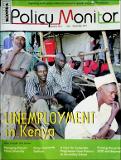Discussion Paper No. 23 of 2002 on Ethnicity, Institutions of Governance and Conflict Avoidance
| dc.date.accessioned | 2021-01-18T12:47:47Z | |
| dc.date.available | 2021-01-18T12:47:47Z | |
| dc.date.issued | 2002 | |
| dc.identifier.uri | http://repository.kippra.or.ke/handle/123456789/2586 | |
| dc.description.abstract | Post-independence Africa has been marked by numerous ethnic conflicts. These conflicts have adversely impacted on the quality of life and have greatly undermined the continent's prospects for development. In addition to disrupting economic and social activities, conflicts have resulted in many fatalities and have generally weakened the institutions of governance. This paper argues that conflicts are the results of poorly designed institutions that are not suited to harmonizing ethnic claims. Ethnic groups behave much like special interest groups that seek to maximize the well being of their members at the expense of other ethnic groups. In institutions where power is centralized (as is the case in many African countries), competition for wealth transfers translates into conflicts. The paper discusses the behaviour of interest groups and proposes institutional reforms for ethnically-fractionalized societies. Specifically, the paper proposes establishment of decentralized institutions of governance complemented by functional governments, therefore creating overlapping ethnic and functional jurisdictions... | en |
| dc.language.iso | en | en |
| dc.publisher | The Kenya Institute for Public Policy Research and Analysis (KIPPRA) | en |
| dc.relation.ispartofseries | DP/23/2002; | |
| dc.subject | Ethnicity | en |
| dc.subject | Conflict Resolution | en |
| dc.subject | Governance institutions | en |
| dc.subject | Ethnic groups | en |
| dc.title | Discussion Paper No. 23 of 2002 on Ethnicity, Institutions of Governance and Conflict Avoidance | en |
| dc.type | KIPPRA Publications | en |
| ppr.contributor.author | Kimenyi, Mwangi S. |
Files in this item
This item appears in the following Collection(s)
-
Discussion Papers [342]




